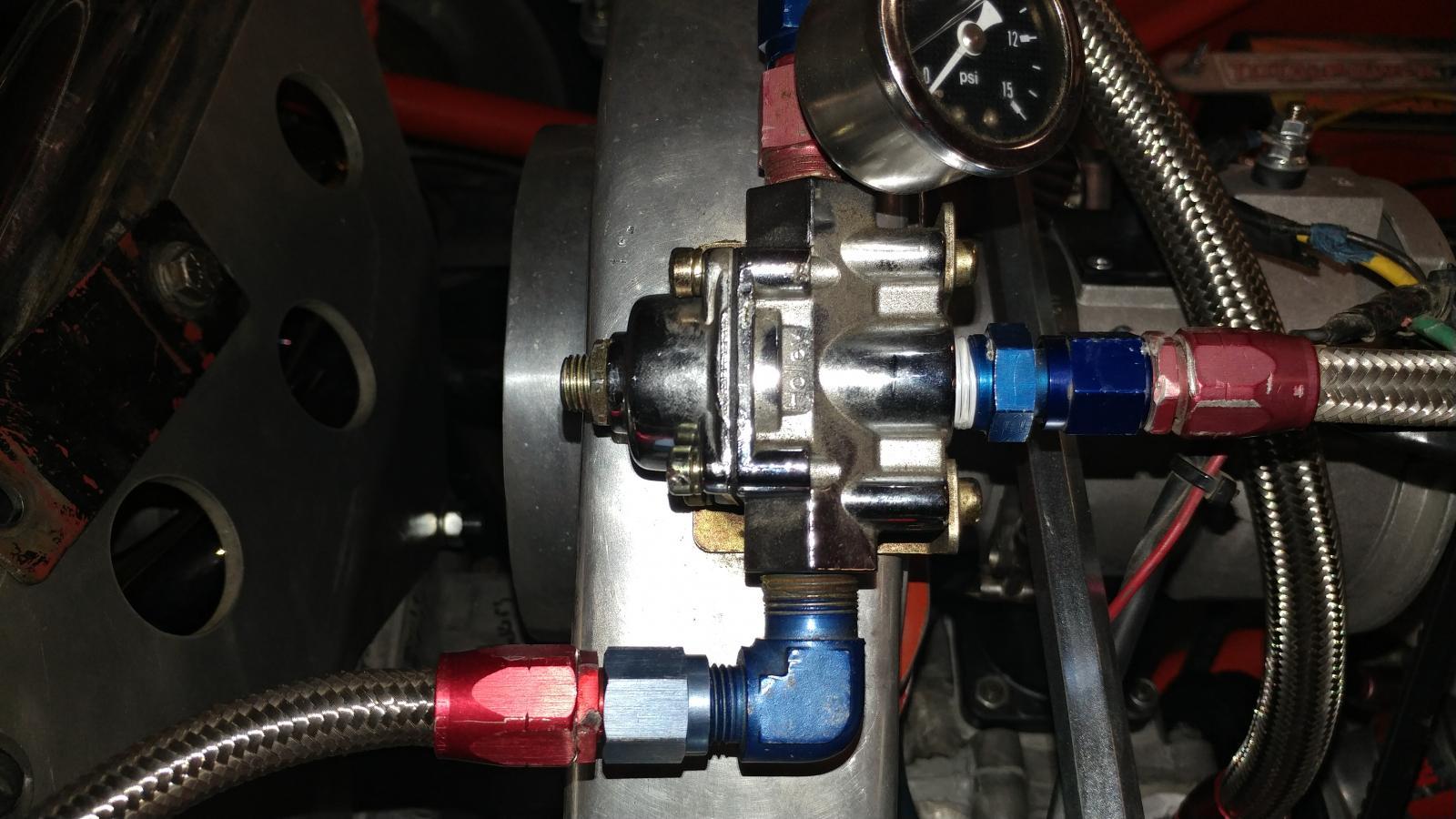Recap from our Engine101 lesson: your vehicle’s internal combustion engine needs a constant influx of fuel, along with air, as inputs for the combustion. This requires gasoline or diesel to be transported from the fuel tank to either the fuel injectors or carburetors, depending on the type of vehicle you have, by the fuel pump. It goes without saying that you will need the best fuel pump for consistent fuel supply and optimal engine performance.
You might think that since it’s only a “pump”, it should be a simple, easy to maintain component of your car and purchasing one should be a no brainer.
In actuality, when it comes to your precious vehicle, especially anything related to the performance of the complex, delicate engine, choosing the best fuel pump which will last you many years on the road and offer reliable service takes some research.
We’ve done the hard work and compiled in this comprehensive guide on fuel pump everything that any car owner must know to get the best fuel pump for their particular vehicle and specific needs.
Learn the importance of a good fuel pump, the different types, symptoms of a bad fuel pump, important buying criteria, and a list of the very best fuel pump models on the market.
Contents
- Function of A Fuel Pump
- Symptoms Of A Faulty Fuel Pump
- Types of Fuel Pumps
- Best Fuel Pump: Buyer’s Guide
- 2024 Best Fuel Pump: Mechanical Fuel Pump
- 2024 Best Fuel Pump: Best Electric Fuel Pumps
- 2024 Best Fuel Pump: Electric Fuel Pumps for Pickup
- 2024 Best Fuel Pump: Electric Fuel Pumps for Carburetor
- Highlights
- 2024 Best Fuel Pump: Electric In-tank Fuel Pumps
- Topscope High Flow Electric In-tank Fuel Pump – $49
- AEM’s 340LPH E85-Compatible High Flow In-Tank Fuel Pump – $98
- Custoneparts Aftermarket Electric InTank Fuel Pump – $26
- MUCO 255LPH Intank Electric Fuel Pump – $24.40
- Aeromotive 340 In-tank Stealth-In Fuel Pump – $111
- Custoneparts New Electric In-tank Fuel Pump for Gas Engines – $63
- Frequently Asked Questions
Function of A Fuel Pump
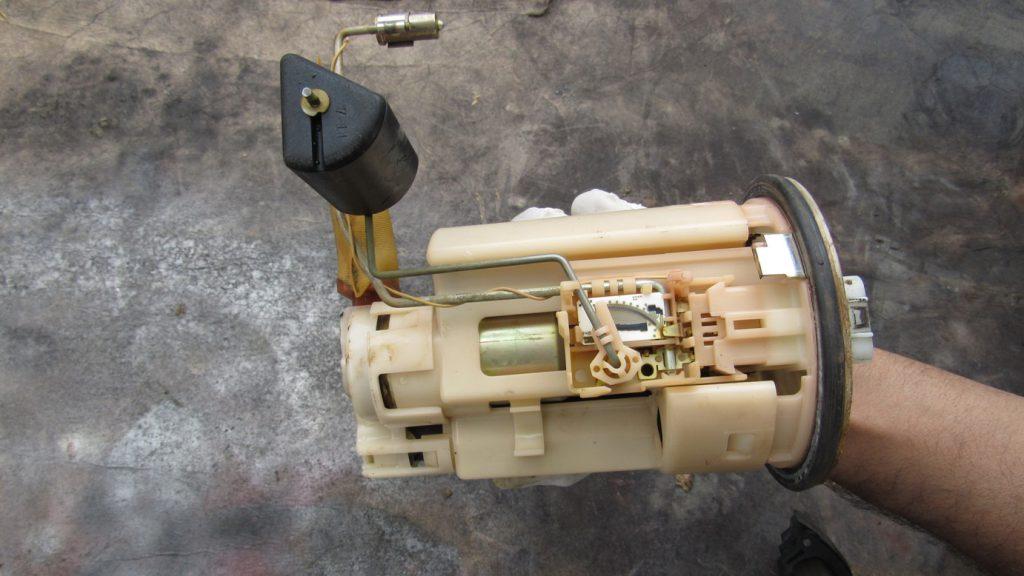
While your engine needs air and fuel to be injected into the combustion chamber, fuel is stored in the fuel tank.
Therefore, a fuel pump, also referred to as a “fuel transfer pump”, is needed to transfer fuel from the fuel tank to the engine, specifically to the carburetors or fuel injectors, which disperse fuel into the combustion chambers of the engine.
Fuel pumps get the job done by combining mechanical or electrical forces with pressure.
A fuel pump itself comprises several pumping systems inside the canister-shaped container, which is about the size of a small jelly jar. First, the fuel feed pump works like a vacuum to suck the gas or diesel in from the tank.
Then, the fuel is filtered through a mesh screen to block any tank residue and is fed into a metering pump. Here, the plunger-like mechanisms push-pull, spin and jostle the fuel to achieve the required pressure.
Once the fuel has been pressurized to a precise level, it is pushed out of the pump, and down through the fuel line. From there, a tiny nozzle sprays a fine mist of fuel into the engine’s combustion chamber. This fuel mist is combined with air at a precise ratio and then ignited to create the combustion.
Read more:
Symptoms Of A Faulty Fuel Pump
It goes without saying that when the fuel pump in your vehicle malfunctions, the engine will not get the correct amount of fuel at the right time, thus its performance will be impeded. Below are the most common symptoms of a faulty pump.
If your car is showing any of these signs, you will want to inspect the fuel pump to determine whether or not it needs to be replaced, along with a few other possible culprits.
Difficulty starting
Because fuel pumps constantly run whenever the ignition is turned on, they can eventually wear out and deteriorate over time. A weaken fuel pump may still pump fuel, but the vehicle may experience difficulty starting from the lack of pressure.
A weakened fuel pump can cause the vehicle to take more cranks to start than normal, and in more serious cases may even cause the vehicle to require multiple turns of the key before it will start.
When a fuel pump completely malfunctions, fuel cannot reach the engine upon ignition. The engine therefore will crank and rev but never catch.
Before attempting to replace the pump, it is always a good idea to check for a blown fuse and/or low pressure in the fuel line.
Engine stalling at high temperature
Many problems can cause stalling, however, when it happens frequently at high temperatures shown on the car’s thermometer, the likely culprit is the fuel pump motor. If stalling continues to occur with an increasing temperature gauge, it could indicate the fuel pump’s deterioration and need for replacement.
Engine sputtering
One of the surest indicators of a faulty fuel pump is a sputtering engine at high speeds because the fuel pump cannot provide a constant stream of fuel to the engine at the ideal pressure. If you’re driving at a consistently high speed and the engine suddenly sputters before returning to normal operation, there are highly likely issues within the fuel pump.
Engine surging
If the pump is sending too much gas to the engine, this might lead to engine surging. While this symptom is commonly associated with fuel pump problems, it can also be a sign of bad gas. To understand why this is the case, as well as other symptoms of the common engine surging problem, consult our comprehensive guide on Engine surging: How to troubleshoot & fix.
Read more
Types of Fuel Pumps
Based on the type of the machine, the fuel pumps are powered differently, however, they can be categorized into 3 major types.
1. Mechanical fuel pumps
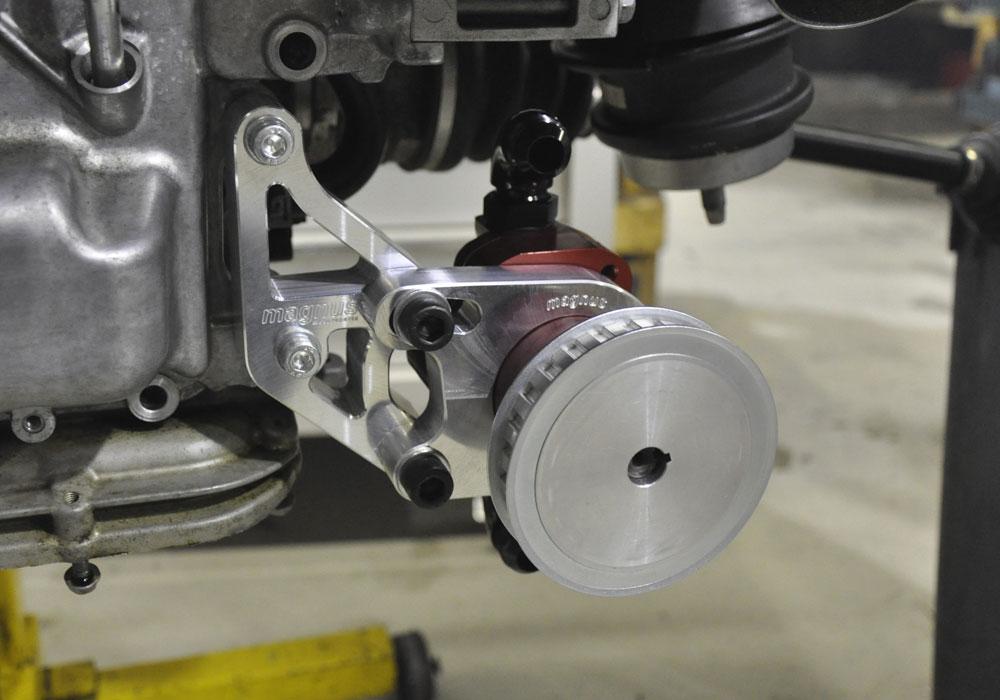
Mechanical fuel pumps are most common on older vehicles, particularly vehicles with carburetors. Before fuel pumps became a necessity for cars, fuel was fed directly from the tanks into the carburetor.
This was done through the act of gravity. Because the mechanical fuel pump pumps the fuel into the carburetor, this slows down the efficiency of the fuel delivery.
Carburetors are no longer common since they pump fuel at very low pressures. Now they are only used exclusively in dated models. These pumps are suitable for instances where electrical conductivity might be hazardous.
Over time, mechanical fuel pumps gave way to electric fuel pumps due to improved fuel efficiency and demand for higher fuel pressures.
Mechanical pumps have several valves and levers that assist in pumping the fuel to the desired place. A lever is placed on the camshaft that puts pressure on the diaphragm. As such, they are typically located under the hood near the front of the motor. The valves serve to inhibit the backward movement of the fuel and thus ensure a one-way flow towards the engine.
>> Read more: Diagnosing And Replacing A Mechanical Fuel Pump
2. Electric fuel pumps
The electric fuel pumps do not require a direct physical connection that would initiate fuel movement. Instead, these pumps require stable direct current to transfer fuel. For this reason, they typically improve fuel economy.
Another advantage of electric fuel pumps is that they can be optimized to provide significantly higher fuel pressures, which are required for modern fuel injection systems and direct injection systems.
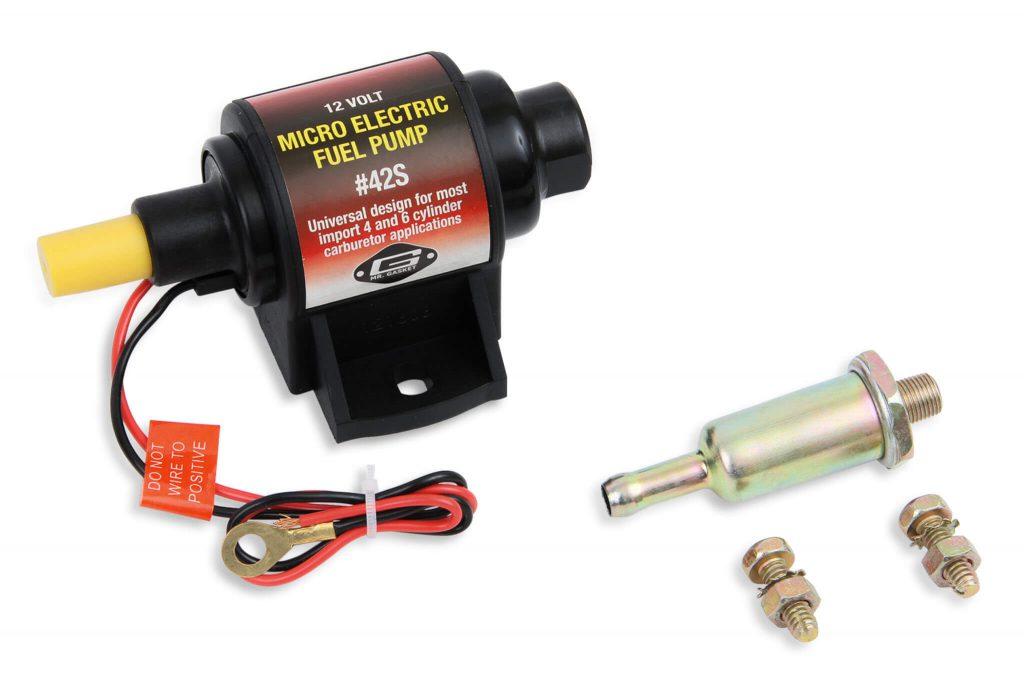
In addition, as they don’t require a mechanical connection, these units are more portable and user-friendly: they can be flexibly placed anywhere. Manufacturers most often place electric fuel pumps inside the fuel tank.
The cost of using cutting-edge technology is a higher price, however, these pumps are well worth the extra dollars as they provide the added safety of minimizing the risk of explosion. The sturdy covering of the pump also serves to avoid damage.
>> Read more: Electronic Fuel Injection – The Reason Behind Its Adoption Over Carburetors
Electric in-tank fuel pump
When a fuel pump is mounted outside the fuel tank, it is an externally mounted or inline fuel pump. If it’s placed inside the tank, it is an in-tank fuel pump.
Historically, electric pumps were placed inside the fuel tank. This helped reduce the risk of fire from extreme heat or spark because gas and diesel are both cool in liquid form and do not explode.
On the downside, if you were running low on fuel, or cornered sharply, the flow of fuel into the pump might be interrupted, and this could not only cause your vehicle’s engine to sputter but might also damage the pump itself.
Inline fuel pump
Technology has advanced and the inline fuel pump was developed, which can safely be mounted outside the fuel tank. Balance and stress sensors ensure that if the pump becomes clogged or damaged, or if the vehicle is in a collision, the pump shuts off, cutting off fuel to the engine and killing it.
Watch more:
3. Manual fuel pumps
As the name suggests, the fuel is transferred from the fuel tank to the combustion chamber manually by using hand pumps, which by rotating siphons the fuel from one place to another.
This type of pump is most convenient when there is a shortage of power supply, as the device requires no electricity and in case the car comes with an unconventional fuel storage such as drums. The manual pump is the cheapest type.
Fuel pumps can also be categorized into three types based on the flow of fuel:
4. Other types of fuel pumps
1. Low speed
This category includes pumps that can move 50 liters of fuel per minute from one point to another. These pumps are useful for transferring fuel in smaller vehicles as they minimize the risk of spillage.
2. Medium speed
By transferring 70 liters per minute, these pumps serve moderate speed and are suitable for large trucks or vehicles with large tanks.
3. High speed
By pumping 90 liters per minute, these pumps get the job done quickly and efficiently and thus are highly recommended for rigorous work fields. Heavy-duty machines would reap the most benefit from these powerful pumps.
Best Fuel Pump: Buyer’s Guide
Choosing the fuel pump most suitable for your particular vehicle and engine does require some thorough research, as there are many buying criteria, from flow rate to pressure to compatibility, all of which are important.
Take the following buying factors into consideration to decide which is the best fuel pump that offers the right balance of different requirements.
Horsepower
The amount of horsepower that your engine has will determine how much fuel flow is required to support that engine. As horsepower increases so does the volume of fuel required to support that power.
A good estimator of volume to power is approximately 10 hp per gallon or 2.64 hp per liter. For example, if your pump flows at 60 gph it should be able to support a 600 hp engine. However, to know the gph you must also consider the fuel pressure required for your engine.
Fuel pressure
Fuel pressure is also a significant feature in handling fuel. Fuel pressure is rated at a gallon per hour and liter per hour at different psi.
Different engines require different fuel pressure. For example, a carbureted engine typically requires between 4 to 7 psi whereas a typical General Motors’ V8 LS based small-block engine runs on about 58 psi.
It is important to know what the maximum pressure your engine will require because fuel pressure has a large effect on how much flow a pump can produce. A fuel pump will flow at its highest volume when there is no pressure, or “free flow”. As fuel pressure increases, fuel flow decreases.
Every pump has a different flow rate at a given pressure. Because of this, it is important to look at a flow chart of whatever pump you decide to buy.
Another note is that different kinds of fuel will produce different types of fuel pressure. Sometimes some fuel pumps can only support a specific type of fuel.
In this case, they can work with non-designated fuel types but will deteriorate very quickly. Using an incompatible fuel type will create a sub-optimal fuel pressure, thus will reduce the durability of the fuel pump.
A side note:
The fuel pressure determines the usage of different kinds of filters and accessories for better performance. In addition, the installation locations of electric pumps depend on the fuel pressure.
Voltage
Fuel pumps have different flow rates at different voltages. As voltage increases so does the speed of the fuel pump which will increase the flow rate at any given pressure.
Therefore when shopping for the best fuel pump for your vehicle, a good practice is checking how a pump is rated at a given voltage. Most cars will produce about 13.5 volts when running.
Fuel type
While most of the pumps are capable of working with various types of fuels, a few of them are not. Thus it is best to check if the fuel pump you are eyeing works with the type of fuel that your vehicle consumes.
Fuel pump locations
Based on the fuel pump installation location, the pump can be varied. Most of the mechanical pumps are engine mounted pumps and placed outside of the fuel tank. Electrical fuel pumps can be mounted both in-tank and externally.
Materials used/ Durability
While you might not need to get a heavy-duty fuel pump for your particular vehicle, durability as always is a crucial factor. A durable fuel pump will save you a lot of time and money on maintenance, and give you higher value for your money.
Materials that claim to meet the “OE standard” will translate to a longer lifespan.
Warranty will be another indication of a fuel pump’s quality and durability. In general, you can expect that the longer a product’s warranty, the more confidence the manufacturer is in its products, or the better its quality and durability.
A good number of products nowadays offer replacement and repair warranties for a variant period.
AC/DC – Alternative Current/Direct Current
Products with Direct Current are often portable and easier to use.
Purpose
You might be purchasing a fuel pump for heavy-duty machinery while others are purchasing it for daily commute.
If the latter is true, there is no need to grab an unnecessarily powerful fuel pump, even if it is rated as the best fuel pump. That would be an overkill, and it will surely cost you more money.
2024 Best Fuel Pump: Mechanical Fuel Pump
Airtex 40987 Fuel Pump – $15.50
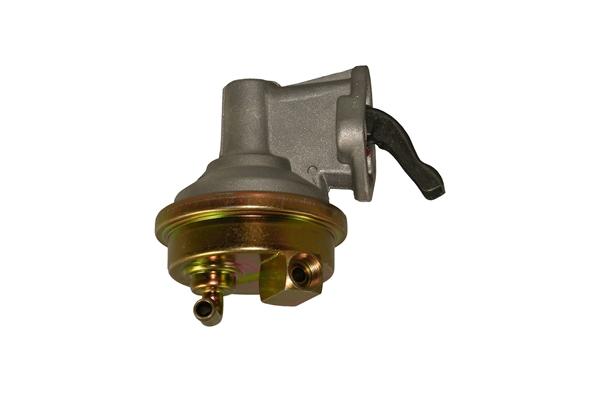
Highlights
- Materials are OEM standards
- Requires only one gasket
- Heat-treated and longer-lasting performance
- Adapts to multi-blended fuel
Cons
- Has only one inlet and outlet
- Might not be compatible with older vehicle models
For only under $20, this mechanical fuel pump can deliver 7.5 to 9 psi a minute with only one gasket. In addition, the case hardened pins and rocker arms are modified to deliver better performance. They are heat-treated for an extended lifespan.
Modern fuels are now multi-blended which can be a problem for some transfer pumps. To deal with this issue, the Airtex fuel pump is equipped with new technologies including upgraded seals and stronger diaphragms.
2024 Best Fuel Pump: Best Electric Fuel Pumps
Bosch Inline Universal Fuel Pump – $142
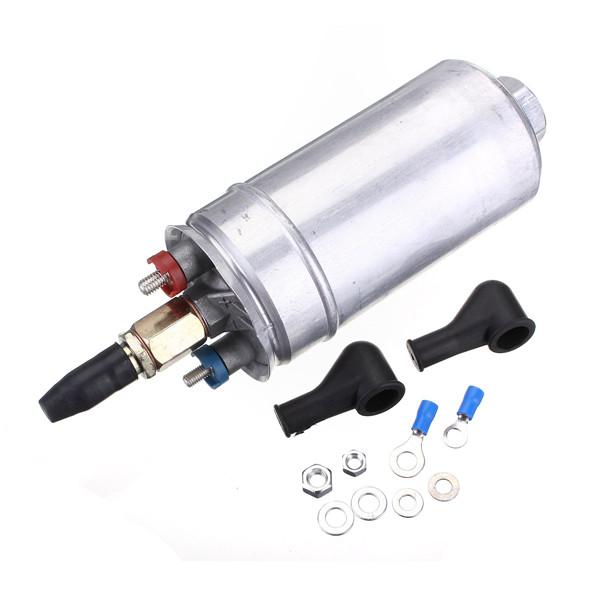
Highlights
- High-pressure electric pump
- Compatible with most vehicles
- Comes with a superior turbine to handle pulsating
- Excellent protection from corrosion
- Stability is ensured with brush contact
In 1967, Bosch produced the first industry-leading high-pressure electric fuel pump. From then to date, the manufacturer has continued to provide reliable products using the latest cutting edge technologies. When you hear “Bosch”, you think of performance and durability.
Despite costing almost $150, this universal fuel pump often comes up in best fuel pump reviews for its consistent high pressure work, compatibility and durability.
Notable features include premium carbon brushes to ensure consistent performance and enhanced durability, polymer encasing for protection from corrosion, and noise reduction.
Bosch 67896 Electric Fuel Pump – $141.95
Highlights
- Consistent performance
- Multiple configurations make it versatile
- Easy installation
Cons
- Installation kit doesn’t come with a gasket
- Slow pump rate
Many car owners would argue that despite being a little pricey, this Bosch model is probably the best fuel pump on the market today and is worth every penny.
When you are getting a Bosch fuel pump, you know it will provide you with quality service for many years to come. Fuel pumps from the brand, as with almost everything else under the brand, are designed to deliver one hundred percent at all times.
These fuel pumps come in multiple configurations, making it compatible with various applications. It’s easy to use and its unique design enables consistent combustion and reduces the risk of inconsistent fuel pressure. A bonus is that the design also reduces noise and vibration.
A downside is since the original packaging of the pump does not include any gaskets, you will have to order it separately or reuse your old gasket.
Delphi FG0053 Fuel Pump – $162
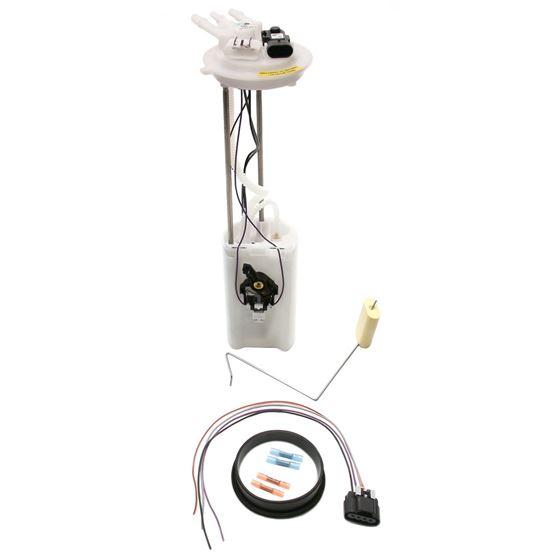
Highlights
- Equipped with power saving technology
- Well-built internal springs
- Large reservoir capacity
- Sensors are well integrated
This Delphi electric high-pressure fuel pump works well with most vehicles. In addition, it boasts many unique features that make one of the best fuel pump models on the market.
The most notable and unique feature is its power-saving technologies, which still ensure efficiency and consistent performance when it comes to results.
This model comes with well-built internal springs which allows for excellent durability and stable performance for at least 150,000 miles.
Delphi units are also designed in a way that they can perform properly under any extreme weather condition. Their bigger terminals and connectors are designed for better heat management and proper fuel flow in varying conditions.
Carter P4070 In-Line Electric Fuel Pump – $54.50
Highlights
- Easy installation
- Quiet
- Heavy-duty
- Internal regulation reduces the change of leakage
This fuel pump is loved for its straightforward installation. The pump comes with a detailed installation kit and a very helpful guide to walk you through the process, so you can easily get it running within one hour.
Perhaps what sets it apart from the best fuel pump models on the market is its heavy-duty performance all the while being quiet, since this pump was originally designed for military usage.
The pump is designed with internal fuel pressure regulation and ‘free flow’ technology to ensure constant flow and to avoid the risk of leakage and burning out.
In addition, it is designed in a way that allows for compatibility and flexible application, so that it can meet varying user’s needs including different power requirements.
A bonus is of course affordability. You get one of the best fuel pump for only around $55 that can perform heavy-duty work, plus can well adapt to your specific needs.
2024 Best Fuel Pump: Electric Fuel Pumps for Pickup
TOPSCOPE Fuel Pump for Pickup – $52
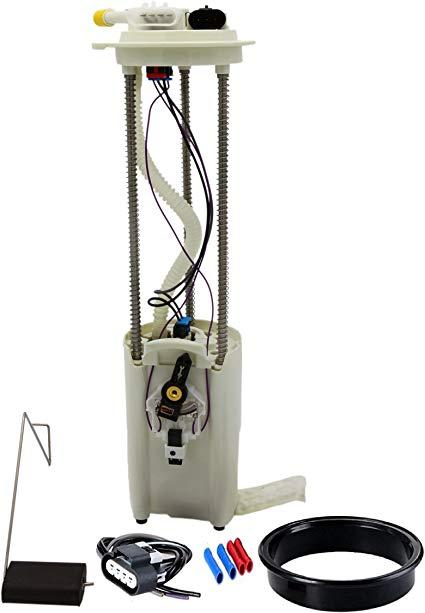
Highlights
- Consistent performance
- Excellent durability
If you rely heavily on Amazon ratings and reviews when making a purchase, this TOPSCOPE fuel pump definitely tops the list of best fuel pump for pickups. It gets an overall rating of 4.4 stars from almost 500 ratings on Amazon, which is rare for the fuel pump category.
This beautifully designed product is very affordable, especially considering its reliability and durability, as hundreds of pickup owners have testified.
This electronic fuel pump, along with other models from the brand, are all designed with OEM quality materials and top of the line improved components for a longer life and better performance.
TOPSCOPE pumps meet or exceed OE specifications in fit, form and function. To ensure consistent delivery of such a high quality level, all pumps are 100% tested before shipping.
ThisTOPSCOPE electric fuel pump is compatible with 1999-2003 Chevrolet Silverado 1500 V6 4.3L / V8 4.8L/ V8 5.3L; 2003-2003 Chevrolet Silverado 1500 V8 6.0L; 2001-2003 Chevrolet Silverado 3500 V8 6.0L/ 8.1L, 999-2003 GMC Sierra 1500 V6 4.3L/ V8 4.8L/ V8 5.3L and 1999-2000 GMC Sierra 2500 V8 5.3L/ V8 6.0L
2024 Best Fuel Pump: Electric Fuel Pumps for Carburetor
W8sunjs Universal 12V Heavy Duty Electric Fuel Pump – $10
Highlights
- Easy installation
- Can handle heavy-duty work
This universal fuel pump offers excellent value for money: it is cheap, easy to use and install, and is compatible with both gasoline or diesel engines. In addition, it can efficiently perform heavy-duty services with an output pressure of 3-6 psi. Not what you would typically expect with such a price tag.
An added bonus is you can use it to suck fuel out of your vehicle as well.
Its being one of the bestsellers on Amazon in this category might be attributable to its unbeatable price. Based on some 800 reviews, this product surely isn’t the best fuel pump when it comes to performance and durability.
Autobest F4027 Externally Mounted Universal Electric Fuel Pump – $22
HIghlights
- Excellent build quality
- Installation is easy
- Durable, reliable and versatile
- High tolerance to ethanol level
Cons
- Only supports gasoline
This externally mounted electric fuel pump is also hard to find regarding price. As for performance, Autobest is known for a vigorous quality assurance process which ensures that each product ready for shipping will work efficiently under varying circumstances and with many vehicle models.
This universal electric pump is tailored for heavy-duty work, so it can be used for factory or construction jobs. It is designed for durability and an added bonus of a higher tolerance for ethanol, making it perfect for fuel systems today.
On the downside, however, the pump only supports gasoline, despite being highly versatile and can adapt to a variety of vehicles.
2024 Best Fuel Pump: Electric In-tank Fuel Pumps
Topscope High Flow Electric In-tank Fuel Pump – $49
Highlights
- Universal product compatible with different vehicles
- Comes with an excellent installation kit
- High-quality and durable
- Satisfying warranty
- High working pressure handling with superb engineering
Topscope is one of the finest brands with a long list of products often rated in best electric fuel pumps reviews. A highlight of this Topscope fuel pump is that it is a universal fuel pump, compatible with many different vehicle models.
The pump will send back excess fuel back to the fuel tank if needed, ensuring that the engine gets exactly what it needs.
The product comes with an excellent installation kit consisting of stainless-steel clamps, wiring, and hoses. The aftermarket fuel pump is different from the original fuel pump, but it will work with the same adaptability.
AEM’s 340LPH E85-Compatible High Flow In-Tank Fuel Pump – $98
Highlights
- Each pump is tested to flow 340 LPH at 40 PSI
- 39mm diameter fits most applications
- Tested and compatible with high pressured ethanol fuels up to E100, methanol fuels up to M100 and all types of gasoline
- Designed for high output naturally aspirated and forced induction EFI vehicles
AEM’s 340LPH E85-Compatible High Flow In-Tank Fuel Pumps feature robust internal construction that is designed to withstand the low lubricity characteristics of ethanol and methanol fuels. They are tested to work with ethanol fuels up to E100, methanol fuels up to M100 and all types of gasoline.
The AEM in-tank fuel pump is designed for in-tank mounting on high-performance, naturally aspirated and forced induction vehicles. It features a compact 39mm diameter that fits most vehicles and an offset inlet design that makes installation easy.
The installation kit includes a wiring harness, pre filter, internal fuel hose, clamps, end cap and rubber buffer sleeve. Quality assurance is excellent: every pump is tested to flow 340 LPH at 40 PSI before it is packaged for sale.
Custoneparts Aftermarket Electric InTank Fuel Pump – $26
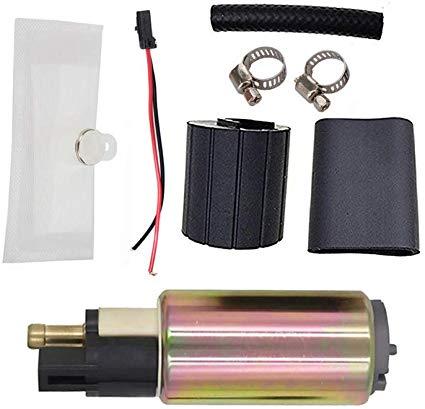
Highlights
- Fuel rate: 140 to 160 LPH
- Easy installation
- Materials are OE standard
- 100% mechanically tested before leaving the factory.
Built to strict quality control standards, this aftermarket electric pump receives raving reviews from car owners and enthusiasts. The fuel pump is designed to produce a fuel flow rate from 140 to 160 Liter per hour flow rate.
This Custoneparts fuel pump is made of industry-leading OE standard materials and manufactured in ISO 9000 / ISO 9001 / ISO 9002 certified facilities.
In addition, 100% of products are mechanically tested prior to leaving the factory to ensure optimal performance and enhanced durability.
Such excellent quality control, coupled with good engineering, gave this fuel pump an overall rating of 4.4 stars on Amazon and is why it often comes up in best fuel pump reviews.
MUCO 255LPH Intank Electric Fuel Pump – $24.40
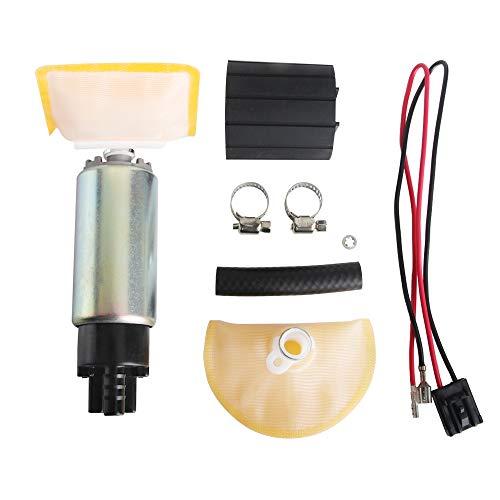
Highlights
- Super high-quality fuel flow at 255 LPH
- High-quality OE standard materials
- Carbon brush and commutator for longer lifespan
- Reasonable warranty and excellent after-sales service
Built to strict quality control standards. this 255LPH fuel pump achieves optimum fuel flow and is capable of supporting applications of up to around 500-600 hp, which is an excellent replacement for high-performance cars or sport/racing usage.
In addition, this fuel pump will last you many years on the road, with high-quality OE standard materials, on top of high-grade carbon brush and carbon commutator for enhanced durability and high pressure work.
Rest assured with the excellent quality control. Each product is manufactured in ISO 9000 / ISO 9001 / ISO 9002 certified facilities with exquisite craftsmanship. 100% are mechanically tested before leaving the factory to ensure optimal performance and durability.
You will not get refurbished or remanufactured parts when opting for this MUCO in-tank fuel pump.
Aeromotive 340 In-tank Stealth-In Fuel Pump – $111
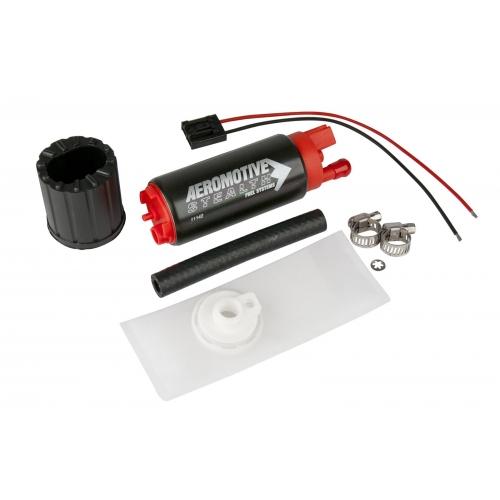
Highlights
- Produces 30% more fuel flow compared to similar competitors
- Ideal for carbureted or EFI applications
- The turbine pump provides excellent mechanical durability
- E85 Compatible
Being the latest addition to the Aeromotive High Performance line, the Aeromotive 340 Stealth is a high-output, in-tank, electric fuel pump that fits most popular EFI applications.
It is a compact and lightweight pump that bolts into most existing hanger assemblies. Designed for compatibility, this fuel pump fits most vehicles for which popular aftermarket pumps are applicable with the 4 inlet configurations.
What sets the 340 Stealth Pump apart is its superior flow throughout a wide pressure range. Compared to other popular aftermarket pumps, at 40 psi the 340 boasts more than 340 lph. That’s over 30% more flow.
This excellent fuel flow is suitable for high-speed driving. The 340 is also ideal for use as a universal replacement for applications that require more flow to support forced air power adders such as turbo and supercharged applications.
Custoneparts New Electric In-tank Fuel Pump for Gas Engines – $63
Highlights
- Compatible with a range of vehicles
- Fuel flow: 255 LPH
- Satisfying warranty
- OE standard materials for a longer lifespan
Custoneparts is a reliable name when it comes to electric fuel pumps, with over 20 years of expertise. This fuel pump specifically designed for gas engines really delivers, just what you would expect from the brand.
This fuel pump will last you a long time and gives you a lot of bang for your buck at only $63. All materials are OE standards, plus high-grade carbon brush and carbon commutator for enhanced durability.
As with other offerings from Custoneparts, each product is manufactured in ISO 9000 / ISO 9001 / ISO 9002 certified facilities and is mechanically tested prior to leaving the factory. The company provides excellent warranty and replacement support.
Frequently Asked Questions
How much should a fuel pump cost?
Depending on performance, the range can be from $25 to $200.
Do all pumps work with all fuel types?
They don’t. Many fuel pumps only work with one specific fuel type. Make sure to check the specifications when shopping for the best fuel pump for your vehicle.
How long is the installation process?
Fuel pumps will typically take 30 minutes to install. For better performance and safety, professional help is recommended.
However, if you are somebody who doesn’t mind having their hands dirty doing a little mechanic work every once in a while, you are welcome to install it by yourself. There are plenty of resources available online to help you with it.
Is flow rate a very important factor?
Yes. The flow rate determines how efficient your pump is going to be. So, never underestimate this factor while making a purchase.

